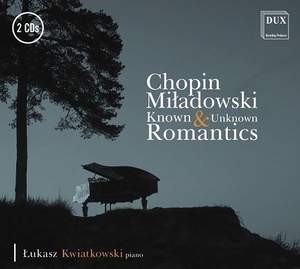Der 1981 in Lodz geborene Pianist Lukasz Kwiatkowski vereint Werke von Florian Miladowski und Frédéric Chopin. Miladowski (1819-1889) war ein polnischer Komponist, Pianist, Dirigent und Musiklehrer. Er studierte u.a. in Berlin und Wien. Nach seinem Studium in Wien ging er nach Frankreich. 1851 ließ er sich in Vilnius nieder, wo er Musik unterrichtete. 1862 ging er erneut nach Frankreich. Bis 1871 war er Professor für Klavier am Collège St. Clément in Metz. Im Juli 1871 zog er nach Nancy und dann nach Bordeaux, wo er starb.
Miladowski komponierte Orchesterwerke, Kammermusik, Lieder und Klavierwerke, ist aber heute weitgehend unbekannt. Dabei sind seine Klavierstücke von sehr guter Qualität und in den engagierten Interpretationen von Lukasz Kwiatkowski denen von Chopin nicht unterlegen.
Auch für Chopins Musik zeigt der Pianist ein gutes Gespür. Er beeindruckt mit Interpretationen, die von reifer Musikalität und großer Intensität zeugen. Sie sind spannungsgeladen und phantasievoll, wechseln zwischen kraftvoller Virtuosität und fein nuancierter Poesie, ohne aber je sentimental zu werden; sie sind kantabel ohne Süße und ohne Plüsch. Kwiatkowskis Interpretationen werden primär vom Musikalischen bestimmt. Sein spannungsgeladener Zugriff und sein weites Dynamikspektrum geben der Musik bei aller Intensität eine sehr große, sehr lebendige Feinheit.
Das Klavier klingt in dieser exzellenten Aufnahmen von Dux angenehm räumlich und gestochen klar.
Born in Lodz in 1981, pianist Lukasz Kwiatkowski combines works by Florian Miladowski and Frédéric Chopin.
Miladowski (1819-1889) was a Polish composer, pianist, conductor and music teacher. He studied in Berlin and Vienna, among other places. After his studies in Vienna, he went to France. In 1851 he settled in Vilnius, where he taught music. In 1862 he went to France again. Until 1871 he was professor of piano at the Collège St. Clément in Metz. In July 1871 he moved to Nancy and then to Bordeaux, where he died.
Miladowski composed orchestral works, chamber music, songs, and piano works, but is largely unknown today. Yet his piano pieces are of very good quality and in Lukasz Kwiatkowski’s committed interpretations they are not inferior to those of Chopin.
The pianist also shows a good feeling for Chopin’s music. He convinces with interpretations that testify to mature musicality and great intensity. They are full of tension and imagination, alternating between powerful virtuosity and finely nuanced poetry, but without ever becoming sentimental; they are cantabile without sweetness and without plush. Kwiatkowski’ tense playing and his wide dynamic range give the music a very great, very lively subtlety despite all its intensity.
The piano sounds pleasantly spacious and clear in this excellent recording by Dux.




















